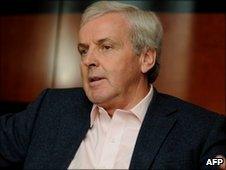Iraq inquiry told France saw invasion as 'dangerous'
- Published

Sir John Holmes said President Chirac was always opposed to the invasion
Former French leader Jacques Chirac believed the Iraq war was a "dangerous venture", the Iraq inquiry has been told as it resumed public hearings.
The UK's Ambassador to France in 2003 said President Chirac was "deeply opposed" to the move, fearing it would "destabilise" the region.
Sir John Holmes said French policy was driven by the aim of stopping the war.
The Chilcot inquiry into the war is meeting for the first time since it suspended hearings for the election.
The inquiry, which has already interviewed Tony Blair and Gordon Brown, is looking at the UK's role in the war, including its build-up and aftermath.
French views
The inquiry halted its public hearings in early March, two months ahead of the general election, stating that it was "non-political" and did not want to influence events.
Since then, it has been analysing the evidence gathered so far, while the five-member panel has visited France and the US to speak to key figures involved in the war.
Reopening public proceedings on Tuesday, chairman Sir John Chilcot said the committee had "covered a great deal of ground" so far and intended to publish a "reliable and authoritative" report around the end of the year.
Giving evidence, Sir John Holmes - ambassador to France between 2001 and 2007 - said Paris became worried during 2002 that the US would take "unilateral action" against Iraq and that the UK would be willing to support this despite British statements that war was "not inevitable".
Although the French government wanted to "keep its options open", Sir John said it declined to take part in any military planning in the autumn of 2002 and the "constant refrain" of its policy was letting United Nations inspectors back into Iraq.
"Their main pre-occupation was to stop the war happening," he said.
Asked about UK-led efforts to secure a further UN resolution to authorise war in early 2003, he said France believed this was a "trap".
France's position remained that existing UN resolutions were not adequate to justify war, he said, but Paris was "always suspicious" that the UK and US would use UN negotiations as "cover for a better basis for war" not to prevent military action.
British officials were "pessimistic" about France supporting a further UN resolution.
However, asked about President Chirac's controversial TV broadcast in March 2003 - when he said he would veto a second resolution - Sir John said he believed the language was somewhat "ambiguous" and not as conclusive as some believed.
The broadcast was seen in London as "extremely unhelpful", he said, but French officials were "upset" it was "seized upon" by certain British ministers as a clear sign the chances of a further resolution had been "scuppered" for good.
Police training
Earlier, a former chief adviser to the Iraqi government said post-war plans to build up the country's police force lacked resources and focus.
Douglas Brand - a former assistant chief constable of South Yorkshire Police who took up his role advising Iraqi officials in July 2003 - said "very few" US or UK officials realised that targets for training 3,000 new police officers every two months were unrealistic due the chaotic post-war situation in the country.
Senior officers associated with the Saddam Hussein regime were removed after the war and there were not enough officers to train up new recruits and equip them for duty in that timescale, he told the inquiry.
"It was quite breathtaking - the expectation that, on the one hand, the new Iraqi army needed an exclusively US training system of some 400 or so individuals, and quite a huge budget under a two star general... and yet there was nothing for police," he said.
"There seemed to be this sort of expectation that the police would rise like a phoenix and just get on with things like they always do."
Mr Brand said warnings about the likely pace of progress were ignored and he constantly had to remind people that "you can't just impose policing without the background, training, development, skillsets and selection" as "it will just not work".
Past evidence
The BBC's world affairs correspondent Peter Biles said Mr Brand's comments tallied with those by several other British officials who have complained about rushed and inadequate post-war planning.
Witnesses due to give evidence in the next month include former UN chief weapons inspector Hans Blix and ex-Deputy Prime Minister John Prescott as well as former chiefs of the defence staff General Sir Richard Dannatt and General Sir Mike Jackson
The current session will end on 30 July and the committee will decide whether to hold a further round of hearings in the autumn.
The inquiry, set up by former prime minister Gordon Brown, is examining events between the summer of 2001 and July 2009, when UK combat troops left Iraq.
Public hearings began in November and the committee has also met the families of some of the 179 British service personnel killed in Iraq.
Attention so far has focused most closely on when the UK government decided to participate in the invasion, the legal case for doing so and planning for post-war Iraq.
In February former Prime Minister Tony Blair told the inquiry he had "no regrets" about toppling Saddam Hussein, describing him as a "monster" and saying the world was a safer place without him.
However, the decision to go to war was attacked by former Cabinet Minister Clare Short and by a senior Foreign Office lawyer Elizabeth Wilmshurst, who resigned in protest at the time. She said she believed the action was unlawful without further UN authorisation.